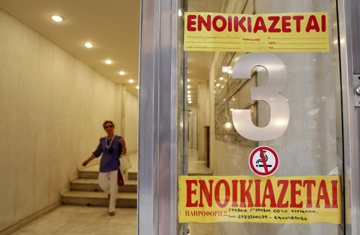
A woman leaves a building next to "for rent" signs in Athens
This story has been updated.
It's hard to be an optimist in Greece these days, but Prime Minister George Papandreou is trying. In a major speech on Saturday in the northern city of Thessaloniki, he told Greeks that painful economic reforms would "unleash the country's creative potential." He promised to cut corporate taxes to stimulate investment, open up restricted professions and privatize the energy market.
Papandreou and Finance Minister George Papaconstantinou are also encouraging investors to buy Greek bonds and assuring them that the country won't default on its 300 billion-euro debt. Papaconstantinou is hopeful that Greece's economy will shrink less than the 4% predicted by the International Monetary Fund (IMF) and the European Union last spring.
But that hope is dimming. Greece's statistics service ELSTAT said last week that gross domestic product in the country shrank 1.8% from the first to the second quarter. That's the steepest quarterly decline since the nation's economy fell into recession at the end of 2008.
And the rest of the year probably won't be any better. Consumers will spend less as they start to feel the effects of the austerity measures that were a stipulation of the 110 billion-euro bail out Greece got from the IMF and the EU last May. And if the government can't cut the deficit by collecting tax revenues — a challenge in a country where people have long evaded income tax — it may be forced to impose a new indirect tax on the petrol that's used to heat homes in winter. That's after already having increased value-added tax on goods by 4%, to 23%, earlier this year.
Greece could find itself caught in a vicious circle, says Yiannis Tsarmougelis, an economics professor at the University of the Aegean, as attempts to tackle debt by imposing new taxes will only further stifle economic growth. "If the government must impose new measures, the economy could even shrink by more than 4%," by year's end, Tsarmougelis says. "It all depends on how well they do collecting tax revenues."
As the Greeks try to cut their deficit, they must also convince international markets that the economy will rebound. But prominent economists say this won't happen anytime soon because the Greek public won't be able to handle a deep recession. Hans-Werner Sinn, head of the Munich-based Ifo Institute for Economic Research, even went so far as to tell UK paper The Daily Telegraph that Greece's austerity measures could push the country to "the edge of a civil war."
Jens Bastian, an economist at the Hellenic Foundation for European and Foreign Policy in Athens, says that kind of talk is both alarmist and wrong-headed. "I think we will not see a dramatic increase in social conflict in Greece and saying so is simply irresponsible," he says. "This crisis is going to test Greeks, yes. But like the markets, they want to see their country return to credibility. They don't want to see it go down in flames."
To regain credibility, the government has to tell the truth, no matter how ugly it is, Bastian says. And it seems to have already learned that lesson. The national statistics agency has fudged data for years, but now appears to be turning to transparency, Bastian notes, as evidenced by the gloomy quarterly reports. "But credibility also means getting on with structural reforms and facing down labor unions," he says. "Both international markets and the Greeks themselves want to see results."
The government has its work cut out for it. A recent poll showed that nearly 70% of Greeks believe current policies won't yield economic growth. Thousands came out to protest the Papandreou's speech on Saturday, including a doctor who was arrested for throwing a shoe at the prime minister. Unemployment is already at 12% — about 4% higher than last year — and retail sales are at a seven-year low. Ingrained problems such as the underground economy, which now compromises about 30% of economic activity, as well as a bloated public sector and a dearth of competitive businesses have hurt the country's productivity.
A recent poll by the MRB agency showed that almost half of Greeks believe their country will default on its foreign debt. Bastian and other economists say that's not likely, yet many Greeks can't help but worry. "What would that mean for the future?" asks Lefteris Papadopoulos, a 27-year-old IT engineer in Athens. "I imagine everything that's already bad will only get worse. Even though I have a job, I think about leaving for another country in Europe or the United States because I don't know if things in Greece — like the corruption, the special favors, the bribes — will change."
Some, though, still have hope. Music teacher Sotiria Palli, 32, sees opportunity in the crisis. Even while she saves up her euros and frets about losing her job, she says the fear of economic disintegration may finally change Greece for the better. "If we hadn't hit bottom, maybe nothing would change," she says. "Now there's a chance something will happen, though a lot will be lost along the way. But I'm beginning to think it's the only way."
